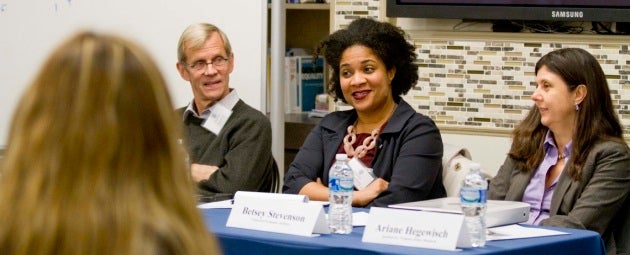Panelists Discuss Women and Equal Pay
The Georgetown Women in Public Policy Initiative and the McCourt School host an event on the foundations of the gender-based wage gap and a debate on potential policy solutions.

On Wednesday, January 28, the Georgetown Women in Public Policy Initiative student group and the McCourt School hosted Betsey Stevenson, of the Gerald R. Ford School of Public Policy at the University of Michigan and member of the White House Council of Economic Advisers,
Fatima Goss Graves of the National Women’s Law Center, and Jim Albrecht, professor of Economics at Georgetown, for a discussion on equal pay for women.
Led by moderator Dave Uejio, Strategy Program Manager at the Consumer Financial Protection Bureau, the panel addressed critical topics like barriers to policy action in the United States, how the wage gap affects women of color, and how other countries like Sweden are finding successful policy solutions.
One remedy cited by the panel is passing the Paycheck Fairness Act, a bill in Congress designed to strengthen equal pay protections for women by making it illegal for employers to retaliate against a worker who inquires about or discloses her or his wages or the wages of another employee.
When it comes to leveling the playing field for women of color, Fatima Goss Graves said an increase in the minimum wage would go a long way.
Jim Albrecht has done extensive research into wage gap issues in Sweden with Georgetown colleague Susan Vroman. Albrecht said the wage discrepancy in Sweden is at the top of the earnings scale, instead of the bottom, thanks in part to stronger unions. Albrecht also cited a common explanation for the wage discrepancies between the genders – the idea of “human capital depreciation” or the degradation of job skills when women take time off to give birth. While Albrecht’s research found no evidence that this phenomenon existed in Sweden, panelists acknowledged it was a common argument against the existence of a wage gap in the US.